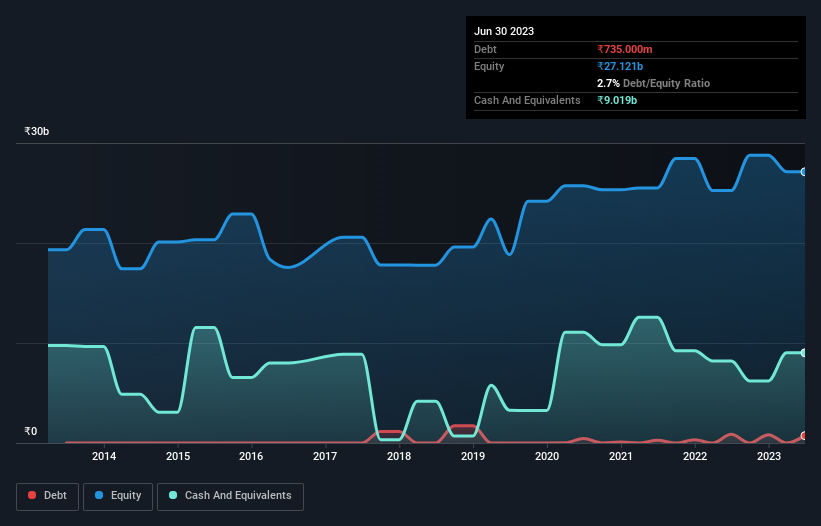Does Bayer CropScience (NSE:BAYERCROP) Have A Healthy Balance Sheet?
David Iben put it well when he said, 'Volatility is not a risk we care about. What we care about is avoiding the permanent loss of capital.' So it might be obvious that you need to consider debt, when you think about how risky any given stock is, because too much debt can sink a company. We can see that Bayer CropScience Limited (NSE:BAYERCROP) does use debt in its business. But the real question is whether this debt is making the company risky.
Why Does Debt Bring Risk?
Generally speaking, debt only becomes a real problem when a company can't easily pay it off, either by raising capital or with its own cash flow. In the worst case scenario, a company can go bankrupt if it cannot pay its creditors. However, a more frequent (but still costly) occurrence is where a company must issue shares at bargain-basement prices, permanently diluting shareholders, just to shore up its balance sheet. By replacing dilution, though, debt can be an extremely good tool for businesses that need capital to invest in growth at high rates of return. The first thing to do when considering how much debt a business uses is to look at its cash and debt together.
View our latest analysis for Bayer CropScience
What Is Bayer CropScience's Net Debt?
You can click the graphic below for the historical numbers, but it shows that Bayer CropScience had ₹735.0m of debt in March 2023, down from ₹864.0m, one year before. But it also has ₹9.02b in cash to offset that, meaning it has ₹8.28b net cash.

How Healthy Is Bayer CropScience's Balance Sheet?
Zooming in on the latest balance sheet data, we can see that Bayer CropScience had liabilities of ₹17.8b due within 12 months and liabilities of ₹1.89b due beyond that. Offsetting this, it had ₹9.02b in cash and ₹9.80b in receivables that were due within 12 months. So its liabilities outweigh the sum of its cash and (near-term) receivables by ₹851.0m.
Having regard to Bayer CropScience's size, it seems that its liquid assets are well balanced with its total liabilities. So it's very unlikely that the ₹235.6b company is short on cash, but still worth keeping an eye on the balance sheet. While it does have liabilities worth noting, Bayer CropScience also has more cash than debt, so we're pretty confident it can manage its debt safely.
Fortunately, Bayer CropScience grew its EBIT by 6.4% in the last year, making that debt load look even more manageable. The balance sheet is clearly the area to focus on when you are analysing debt. But it is future earnings, more than anything, that will determine Bayer CropScience's ability to maintain a healthy balance sheet going forward. So if you're focused on the future you can check out this free report showing analyst profit forecasts.
Finally, a company can only pay off debt with cold hard cash, not accounting profits. Bayer CropScience may have net cash on the balance sheet, but it is still interesting to look at how well the business converts its earnings before interest and tax (EBIT) to free cash flow, because that will influence both its need for, and its capacity to manage debt. In the last three years, Bayer CropScience's free cash flow amounted to 45% of its EBIT, less than we'd expect. That's not great, when it comes to paying down debt.
Summing Up
While it is always sensible to look at a company's total liabilities, it is very reassuring that Bayer CropScience has ₹8.28b in net cash. And it also grew its EBIT by 6.4% over the last year. So we are not troubled with Bayer CropScience's debt use. The balance sheet is clearly the area to focus on when you are analysing debt. However, not all investment risk resides within the balance sheet - far from it. We've identified 1 warning sign with Bayer CropScience , and understanding them should be part of your investment process.
When all is said and done, sometimes its easier to focus on companies that don't even need debt. Readers can access a list of growth stocks with zero net debt 100% free, right now.
Valuation is complex, but we're here to simplify it.
Discover if Bayer CropScience might be undervalued or overvalued with our detailed analysis, featuring fair value estimates, potential risks, dividends, insider trades, and its financial condition.
Access Free AnalysisHave feedback on this article? Concerned about the content? Get in touch with us directly. Alternatively, email editorial-team (at) simplywallst.com.
This article by Simply Wall St is general in nature. We provide commentary based on historical data and analyst forecasts only using an unbiased methodology and our articles are not intended to be financial advice. It does not constitute a recommendation to buy or sell any stock, and does not take account of your objectives, or your financial situation. We aim to bring you long-term focused analysis driven by fundamental data. Note that our analysis may not factor in the latest price-sensitive company announcements or qualitative material. Simply Wall St has no position in any stocks mentioned.
About NSEI:BAYERCROP
Bayer CropScience
Engages in the manufacture, sale, and distribution of insecticides, fungicides, herbicides, and various other agrochemical products and hybrid corn seeds in India, Germany, Bangladesh, and internationally.
Excellent balance sheet with reasonable growth potential.
Similar Companies
Market Insights
Community Narratives



